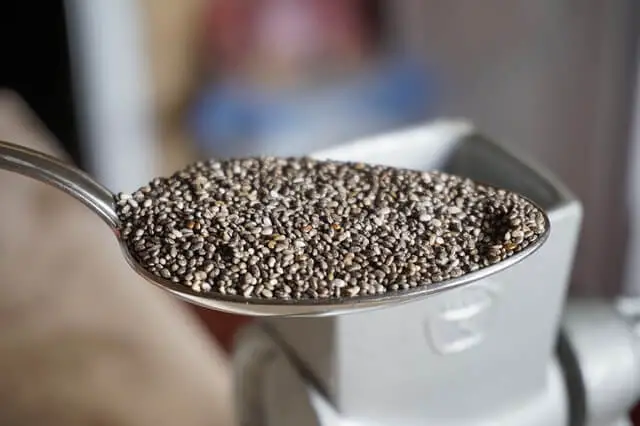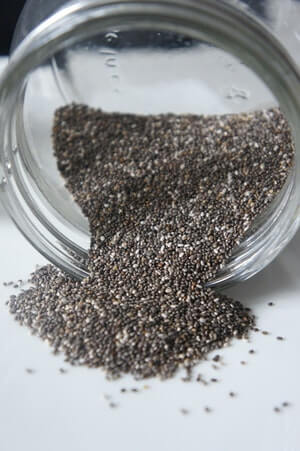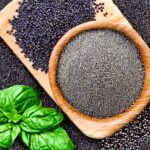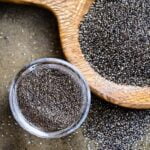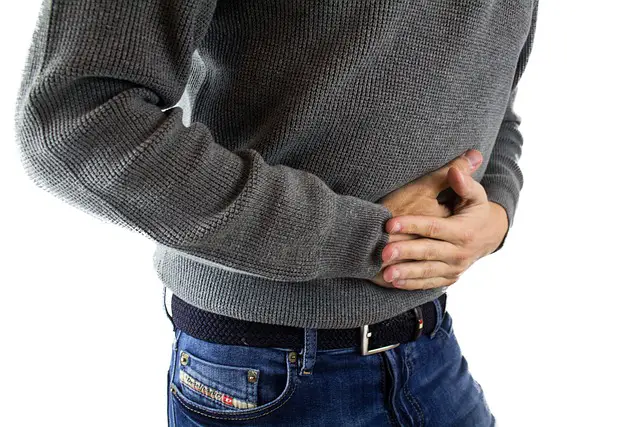
Chia seeds have become a popular superfood in recent years, thanks to their high fiber, protein, and healthy fat content. Many people incorporate chia seeds into their diet for their potential health benefits, but some individuals may experience bloating when consuming chia seeds, especially if they are not used to eating high-fiber foods.
In this article, we’ll explore whether chia seeds can cause bloating and what can be done to minimize or stop any bloating caused by them.
- Do Chia Seeds Cause Bloating?
- How to Stop Bloating from Chia Seeds?
- How Long Does Bloating from Chia Seeds Last?
- How Much is Too Much Chia Seeds?
- Can Chia Seeds Cause Intestinal Blockage?
- Do Chia Seeds Cause Water Retention?
- Final Thoughts
Do Chia Seeds Cause Bloating?
Chia seeds are often consumed for their potential health benefits, which include improving digestion, reducing inflammation, and promoting weight loss. However, some people may experience bloating when they consume chia seeds, particularly if they are not used to eating high-fiber foods.
Bloating is a common digestive issue that can cause discomfort and a feeling of fullness in the abdominal area. It can be caused by a number of factors, including eating large amounts of fiber, consuming gas-producing foods, or having an underlying digestive condition.
Chia seeds are high in fiber, with about 10 grams of fiber per ounce (28 grams). This is a significant amount of fiber, and consuming large quantities of chia seeds or increasing your fiber intake too quickly can cause bloating and other digestive issues. To minimize the risk of bloating, it is important to start with a small serving of chia seeds and gradually increase your intake as your body becomes accustomed to them.
It is also worth noting that chia seeds are high in mucilage, which is a gel-like substance that can help to slow down digestion. This can help to keep you feeling full and satisfied, but it can also contribute to bloating if you consume too many chia seeds.
In addition to bloating, some people may experience other digestive side effects when they consume chia seeds, including gas, constipation, or diarrhea. These side effects are usually temporary and can be minimized by starting with a small serving of chia seeds and gradually increasing your intake as your body becomes accustomed to them.
How to Stop Bloating from Chia Seeds?
Bloating is a common digestive issue that can cause discomfort and a feeling of fullness in the abdominal area. Chia seeds are high in fiber and if consumed in high quantity or too quickly can lead to bloating and other digestive issues. But, there are ways to stop bloating from chia seeds.
First and foremost, it’s important to start with a small serving of chia seeds and gradually increase your intake as your body becomes accustomed to them. This will help your body to adjust to the high fiber content and minimize the risk of bloating.
Secondly, if you are eating raw chia seeds, it’s important to chew chia seeds thoroughly before swallowing them. This will help to break down the seeds and make them easier to digest, thus reducing the risk of bloating.
An even better method of eating them is soaking them in water or another liquid before consuming them. This process will soften the seeds and make them easier to swallow, and they will be more easily digested in your body.
Another option is to grind chia seeds instead. This can help you digest chia seeds by breaking down their outer shell so that your digestive system can break them down easier.
Thirdly, it’s essential to drink plenty of water when consuming chia seeds. Chia seeds absorb a lot of water and if you do not drink enough fluids, they can absorb the water in your digestive system, potentially causing dehydration. This can also contribute to bloating and constipation, which is why it’s important to drink enough water when consuming chia seeds.
Another thing to consider is consuming chia seeds with other foods, particularly foods that are high in protein and fat. This can help to slow down digestion and minimize bloating.
In addition to the above, it’s also essential to pay attention to your body and monitor how it responds to chia seeds. Everyone’s body is different, and it’s essential to adjust your intake of chia seeds based on your own personal tolerance. If you experience bloating or other digestive side effects when consuming chia seeds, try reducing your intake or consuming them in a different way.
Another way to stop bloating caused by chia seeds is to consume them with probiotics. Probiotics are beneficial bacteria that can help to promote a healthy balance of microorganisms in the gut, which can reduce the risk of bloating and other digestive issues. You can get probiotics from fermented foods such as yogurt, kefir, sauerkraut, or kimchi or you can supplement with probiotic supplements.
Additionally, it’s important to take care of your overall gut health by eating a diet rich in fruits, vegetables, and whole grains, as well as avoiding foods that are known to cause gas, bloating, and other digestive issues. This can help to reduce the risk of bloating and other digestive issues caused by chia seeds.
In summary, bloating is a common side effect of consuming chia seeds, but it can be minimized by starting with a small serving, gradually increasing the intake, chewing the seeds well, drinking enough water, combining chia seeds with other foods, paying attention to your body’s response, consuming chia seeds with probiotics, and taking care of gut health. With the right approach, you can enjoy the many benefits of chia seeds without experiencing any negative side effects.
Some tips for minimizing the risk of bloating when consuming chia seeds include:
- Start with a small serving: To minimize the risk of bloating and other digestive side effects, it is best to start with a small serving of chia seeds and gradually increase your intake as your body becomes accustomed to them.
- Soak the seeds: Soaking chia seeds in water or another liquid can help to soften them and make them easier to digest. This can help to minimize bloating and other digestive side effects.
- Drink plenty of water: Chia seeds are high in fiber and can absorb a large amount of water. It is important to drink plenty of water when consuming chia seeds to help prevent dehydration and promote regular bowel movements. (See: Do Chia Seeds Make You Poop?)
- Eat chia seeds with other foods: Eating chia seeds with other foods, particularly foods that are high in protein and fat, can help to slow down digestion and minimize bloating.
- Pay attention to your body: Everyone’s body is different, and it is important to pay attention to how your body responds to chia seeds and make adjustments to your intake as needed. If you experience bloating or other digestive side effects when consuming chia seeds, try reducing your intake or consuming them in a different way (such as soaking them in water first).
How Long Does Bloating from Chia Seeds Last?
The duration of bloating from chia seeds can vary depending on the individual and how much chia seeds were consumed. In most cases, bloating should subside within a day or two, once your body has had a chance to adjust to the high fiber content of the seeds. However, in some cases, bloating can last longer, especially if a large amount of chia seeds were consumed, or if you already have a sensitive stomach.
To minimize the risk of bloating, it’s important to start with a small serving of chia seeds and gradually increase your intake as your body becomes accustomed to them. Chewing the seeds thoroughly before swallowing and drinking enough water while consuming chia seeds can also help to reduce bloating.
It’s also worth noting that other factors such as stress, certain medical conditions, and certain medications can also cause bloating, so it’s essential to pay attention to your body and monitor how it responds to chia seeds. If you experience bloating or other digestive side effects that don’t subside after a few days, it’s best to consult with a healthcare professional to rule out any underlying issues.
In summary, bloating caused by chia seeds should subside within a day or two, but in some cases, it can last longer. It’s important to start with a small serving, chew chia seeds well, drink enough water and monitor your body’s response. If bloating or other side effects persist, it’s best to consult with a healthcare professional to rule out any underlying issues.
How Much is Too Much Chia Seeds?
The recommended serving size of chia seeds is generally around 2 tablespoons (about 28 grams) per day. This is equivalent to about 12 grams of fiber. Consuming more than this amount can increase your risk of experiencing digestive side effects such as bloating, gas, and constipation. If you feel like your body has been able to handle that amount, you could potentially increase this amount to up to 4 tablespoons, but only gradually and as you feel like your body is ok with it. (Learn more at How Much Chia Seeds Should You Eat a Day)
It’s worth noting that too much chia seeds can lead to a high intake of certain nutrients, such as fat and some minerals, that can lead to adverse effects. For example, consuming too many chia seeds can lead to an excessive intake of omega-3 fatty acids, which can interfere with blood clotting and increase the risk of bleeding in some individuals.
Additionally, consuming too many chia seeds can also interfere with mineral absorption. High intake of phytic acid, a compound found in chia seeds and other seeds, can interfere with the absorption of iron, zinc, and calcium.
Furthermore, high doses of chia seeds can lead to dehydration, as the seeds can absorb a lot of liquid from the gut.
It’s always best to consult with a healthcare professional, especially if you have any specific health conditions, before adding any new food supplement to your diet, like chia seeds. They can help you determine the appropriate serving size for your individual needs and help you monitor for any potential side effects.
In summary, the recommended serving size of chia seeds is 2 tablespoons (about 28 grams) per day, which corresponds to 12 grams of fiber. Consuming more than this amount can lead to excessive intake of certain nutrients, interfere with mineral absorption, and lead to dehydration.
Can Chia Seeds Cause Intestinal Blockage?
While chia seeds are generally considered to be safe and healthy to consume, there is a small risk that they could cause an intestinal blockage, particularly if they are consumed whole and not chewed thoroughly.
Chia seeds are small, hard, and fibrous, and when consumed whole, they can potentially become stuck in the intestinal tract and cause a blockage. This risk can be reduced by thoroughly chewing the seeds before swallowing them. Additionally, soaking chia seeds in liquid before consuming them can help to soften them, making them easier to digest and less likely to cause a blockage.
It’s also worth noting that people with certain medical conditions such as diverticulitis, inflammatory bowel disease, or other conditions that can cause narrowed or blocked intestinal tracts should be cautious when consuming chia seeds. They should speak with their healthcare provider to determine if chia seeds are safe for them to consume.
It’s important to pay attention to how your body reacts when consuming chia seeds, if you experience symptoms such as severe abdominal pain, vomiting, constipation or difficulty passing stools, you should seek medical attention immediately as these can be signs of an intestinal blockage.
In summary, while chia seeds are generally considered to be safe and healthy, there is a small risk that they could cause an intestinal blockage, particularly if they are consumed whole and not chewed thoroughly. To minimize this risk, it is important to chew chia seeds thoroughly, soak them in liquid before consuming them and pay attention to how your body reacts when consuming chia seeds.
Do Chia Seeds Cause Water Retention?
Chia seeds are known to absorb a lot of water, and this can help to keep you feeling full and hydrated, but it can also lead to water retention in some people.
Chia seeds absorb water and form a gel-like substance called mucilage, which can help to slow down digestion and promote a feeling of fullness. However, if you consume too many chia seeds or if you don’t drink enough water when consuming them, they can absorb the water in your digestive system and cause water retention.
Water retention can cause swelling and puffiness in various parts of the body such as the legs, feet, and hands. This is especially the case if chia seeds are consumed in large amounts.
To minimize the risk of water retention when consuming chia seeds, it’s essential to drink plenty of water when consuming chia seeds to keep yourself hydrated and make sure to consume them in appropriate amounts.
In summary, chia seeds absorb a lot of water and can cause water retention in some people if consumed in large quantities or if they don’t drink enough water when consuming them. To minimize the risk of water retention it’s important to drink enough water and consume chia seeds in appropriate amounts.
Final Thoughts
In conclusion, chia seeds are a nutritious and healthy food that offers a wide range of benefits, but they can cause bloating in some individuals, particularly if they are not used to consuming high-fiber foods or if they consume too many chia seeds at once.
To minimize bloating and other digestive side effects, it is important to start with a small serving of chia seeds and gradually increase your intake as your body becomes accustomed to them. Additionally, be sure to drink plenty of water and consider soaking the seeds in water or another liquid before consuming them to help soften them and make them easier to digest. With the right approach, you can enjoy the many benefits of chia seeds without experiencing any negative side effects.
Lance has been passionate about the plant-based diet and we have been following a whole food plant-based diet for over 5 years. We focus on health, natural healing, weight management, animal rights, and the health of the planet and environment by focusing on whole plant-based foods and sustainable practices.
Learn more at the About Me page and follow on social media at the links below.

